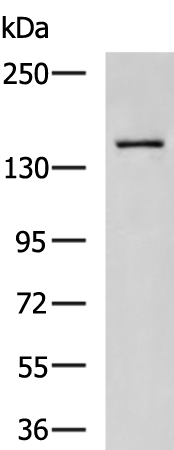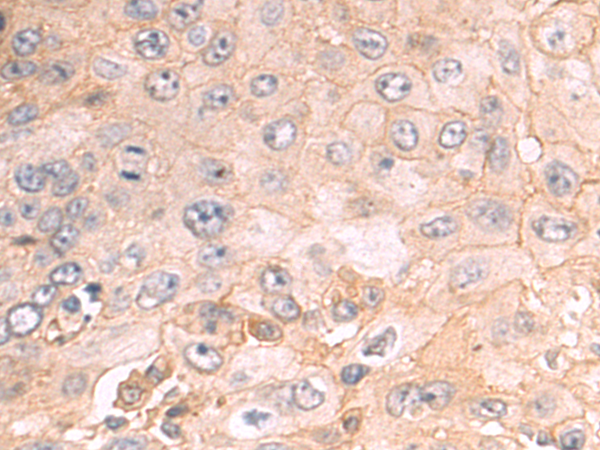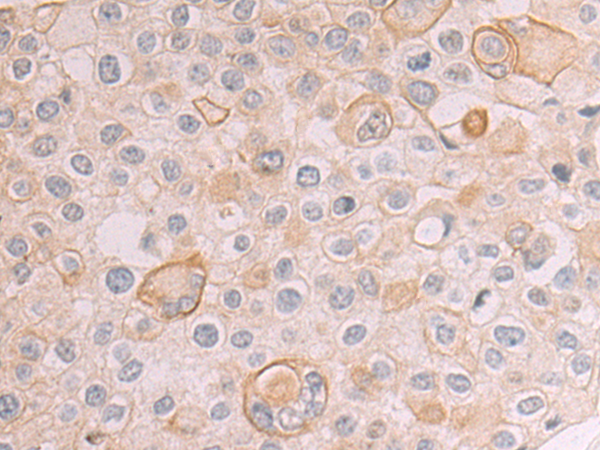


| WB | 咨询技术 | Human,Mouse,Rat |
| IF | 咨询技术 | Human,Mouse,Rat |
| IHC | 1/50-1/200 | Human,Mouse,Rat |
| ICC | 技术咨询 | Human,Mouse,Rat |
| FCM | 咨询技术 | Human,Mouse,Rat |
| Elisa | 1/5000-1/10000 | Human,Mouse,Rat |
| Aliases | MEGF5; SLIL2; SLIT1; slit2; Slit-3 |
| WB Predicted band size | 168 kDa |
| Host/Isotype | Rabbit IgG |
| Antibody Type | Primary antibody |
| Storage | Store at 4°C short term. Aliquot and store at -20°C long term. Avoid freeze/thaw cycles. |
| Species Reactivity | Human, Mouse, Rat |
| Immunogen | Synthetic peptide of human SLIT3 |
| Formulation | Purified antibody in PBS with 0.05% sodium azide and 50% glycerol. |
+ +
以下是3篇涉及SLIT3抗体的研究文献摘要:
1. **"SLIT3 inhibits endothelial cell inflammation and atherosclerosis via binding to Robo4"**
- **作者**: Guo S, et al.
- **摘要**: 研究发现SLIT3通过结合受体Robo4抑制内皮细胞炎症反应,并减少动脉粥样硬化斑块形成。实验中使用SLIT3抗体验证了其在血管内皮中的表达及功能调控。
2. **"SLIT3 promotes vascular smooth muscle cell migration via Robo1 in pulmonary arterial hypertension"**
- **作者**: Li Y, et al.
- **摘要**: 该文献揭示了SLIT3通过Robo1受体激活促进肺动脉高压中血管平滑肌细胞的迁移,Western blot和免疫荧光实验中采用SLIT3抗体检测其表达水平,提示其作为潜在治疗靶点。
3. **"SLIT3-mediated fibroblast-to-myofibroblast differentiation drives cardiac fibrosis"**
- **作者**: Chen J, et al.
- **摘要**: 研究证实SLIT3通过激活TGF-β信号通路促进心脏成纤维细胞向肌成纤维细胞转化,导致心肌纤维化。免疫组织化学中应用SLIT3抗体显示其在纤维化心脏组织中的高表达。
The SLIT3 antibody is a tool used to detect and study SLIT3. a secreted glycoprotein belonging to the SLIT family (SLIT1-3). SLIT proteins are evolutionarily conserved ligands known for their roles in axon guidance, neuronal migration, and cellular signaling by interacting with Roundabout (ROBO) receptors. SLIT3. encoded by the *SLIT3* gene on human chromosome 5q35. is involved in diverse biological processes, including angiogenesis, tissue remodeling, and organ development. Unlike SLIT1 and SLIT2. which are primarily neural, SLIT3 exhibits broader expression in non-neural tissues like the heart, kidneys, and skeletal system.
Antibodies targeting SLIT3 enable researchers to investigate its expression patterns, localization, and interactions in physiological and pathological contexts. They are widely used in techniques like immunohistochemistry, Western blotting, and immunofluorescence. SLIT3 has been implicated in diseases such as cancer, where it may act as a tumor suppressor or promoter depending on the context, and cardiovascular disorders, where it regulates vascular smooth muscle cell behavior. Its role in bone metabolism and fibrosis is also under active study.
Commercial SLIT3 antibodies vary in specificity (monoclonal vs. polyclonal) and host species (e.g., rabbit, mouse). Validation via knockout controls or peptide blocking is critical to ensure reliability. Research using these antibodies continues to unravel SLIT3’s complex functions, offering potential therapeutic insights for conditions like metastasis, atherosclerosis, and tissue scarring.
×